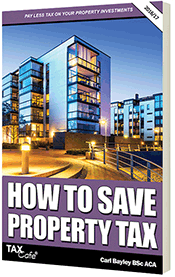How to Pay Less Property Capital Gains Tax
How to Save CGT when You Sell a Property
Here we will cover an interesting property capital gains tax scenario that covers lots of important tax planning issues:
The latest information can be found in our guide:
How to Save Property Tax
"I will be selling one of my now empty commercial properties in the current 2011/12 tax year. I’m sad about this as the whole building is in excellent order and I always saw myself keeping it forever. However, given the economic climate, full empty rating, and what appears to me to be a seismic shift in high street retailing, I have concluded I should sell.
"The property is owned jointly and equally with my wife. Our incomes are down a little this year (we have other vacant office properties) which will bring us below the higher rate threshold. I expect our current year income could be around £30,000 each, though we could reduce this to around £15,000 each as we are still in a position to postpone taking any dividends this year from a separate limited company that we own.
"We can also take the opportunity to crystallise some losses on stock market investments in this tax year – perhaps £2,500 each.
"This office building was purchased around 20 years ago for about £90,000 and about £100,000 was spent refurbishing it. Other transaction costs and fees may add up to around £5,000. All other costs over the 20 years have been general maintenance charged back to tenants as service charges. The building is likely to be sold for £340,000.
"What is our capital gains tax liability likely to be and are there any strategies we can employ to reduce it as much as possible?"
Your profit from this investment is £145,000 (£340,000 less £90,000 purchase price less £100,000 refurbishment costs less £5,000 transaction costs).
(I am making the assumption that the £100,000 you spent refurbishing the property can all be treated as improvement costs for capital gains tax purposes.)
The good news is that your taxable capital gain could be lower thanks to the fact that the property is owned by both you and your wife and because you have capital losses that can be set off against the gain. If you crystallise your stock market losses by selling those investments by 5th April 2012, you will be able to set those losses off against the gain on the property.
You are also fortunate because a substantial amount of your income comes from your company. Unlike most other taxpayers, company owners are in the fortunate position of being able to control their taxable incomes from year to year. This includes paying themselves less income during years in which they have taxable capital gains.
Why is this a benefit? Under the current capital gains tax rules two tax rates apply to most gains: 28% for higher-rate taxpayers and 18% for taxpayers who have not used up their £35,000 basic-rate band with other income.
Assuming that you are each able to keep your taxable income this year to just £15,000 by not taking any income out of your company before 6th April 2012, you will each have £27,475 of your £35,000 basic-rate band remaining: i.e. this much of your capital gains will be taxed at just 18%.
The figure of £27,475 is derived by deducting your taxable income of £15,000 from the higher-rate income tax threshold of £42,475. If either of you will be aged 65 or more on 5th April 2012, however, then you will have more of your basic rate band available, since you will have a higher income tax personal allowance.
Your net gain from selling the property is £145,000, i.e. £72,500 each. Assuming that you are both aged under 65, your capital gains tax bills can be calculated as follows:
Net gain - £72,500
Less: Capital losses - £2,500
Less: CGT exemption - £10,600
Taxable gain - £59,400
£27,475 @ 18% - £4,946
£31,925 @ 28% - £8,939
CGT bill (each) - £13,885
Total CGT bill - £27,770
This isn’t such a bad outcome when you consider that your effective tax rate on the £145,000 profit is just 19%. In the worst case scenario, you could have paid 28% tax on the whole gain – an extra £12,830!
This is a very good effective rate and you may therefore prefer to simply pay the tax. However, if you wish to make further savings, you could defer some or all of this tax by investing some of your sale proceeds in enterprise investment scheme shares. You could defer all of the tax be investing £59,400 each, or just the higher rate tax by investing £31,925 each.
You may even be able to invest in your own company if it qualifies for the scheme (most property companies will not qualify, however).
If you defer your property sale to 2012/13, you might even be able to exempt your gain altogether by investing in the new seed enterprise investment scheme, although this could be a pretty risky strategy as we do not yet have many details on this scheme.
Personally though, if it was me, I would probably just pay the 19%!






